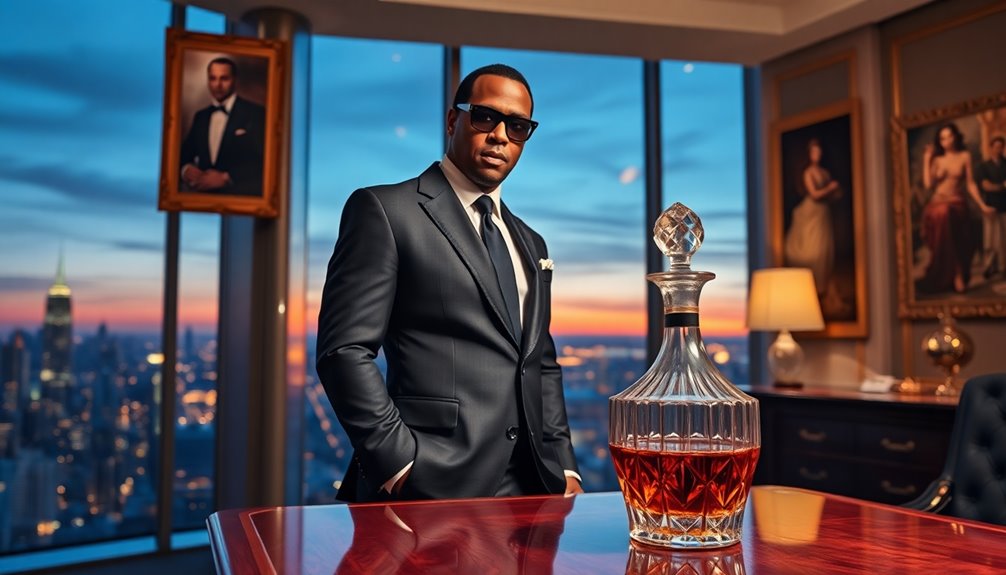Vanilla Ice's hit "Ice Ice Baby" isn't just a nostalgic anthem; it's a cash cow, generating around $400,000 in music royalties each year. Released in 1990, the song topped charts and helped hip-hop gain mainstream acceptance. Despite facing challenges, like bankruptcy and personal struggles, Ice transformed his fortunes through smart real estate investments and merchandise. As of 2024, his net worth is estimated at $20 million, reflecting both his earlier success and ongoing ventures. This enduring legacy proves that even one-hit wonders can find financial stability, and there's more to his story than meets the eye.
Key Takeaways
- Vanilla Ice's "Ice Ice Baby" remains a lucrative asset, generating approximately $400,000 in annual music royalties as of 2024.
- The song's success established Vanilla Ice as a major figure in hip-hop and opened doors for future artists.
- His debut album "To the Extreme" sold over 15 million copies, dominating charts and solidifying his financial success in the '90s.
- Vanilla Ice's real estate ventures, valued at around $5 million, contribute significantly to his estimated net worth of $20 million today.
- Despite past financial struggles, Vanilla Ice has diversified his income through music royalties and real estate, ensuring lasting financial stability.
Introduction

How did Vanilla Ice transform from a rap sensation into a multifaceted entertainer? You might remember his iconic track "Ice Ice Baby," which skyrocketed to fame in August 1990, becoming the first hip hop single to top the Billboard Hot 100 chart. This breakthrough led to his debut album, "To the Extreme," which dominated the Billboard 200 for 16 weeks and sold over 15 million copies worldwide. With hits like "Play That Funky Music" and "Stop That Train," Vanilla Ice became a household name almost overnight. His album was certified 7× Platinum by RIAA, solidifying its impact on the music industry.
But he didn't stop there. In March 1991, he starred in the film "Cool as Ice," which, despite its mixed reviews, gained a cult following. As the years passed, he experimented with music styles, releasing "Hard to Swallow" in 1999, a shift towards alternative rock and nu-metal.
Though he faced challenges, including media scrutiny and declining popularity, Vanilla Ice reinvented himself through reality TV and home improvement shows, proving his adaptability. By diversifying his career, he transformed from a fleeting '90s sensation into a versatile entertainer, continuously finding new avenues for success.
Early Life and Background

Vanilla Ice, born Robert Matthew Van Winkle on October 31, 1967, in Dallas, Texas, had a childhood marked by upheaval and resilience. You might find it surprising that he never knew his biological father, taking the name of his stepfather, Bob Van Winkle, after his parents divorced when he was just four. Raised primarily by his mother, Camilla Beth, and his stepfather, he faced challenges that shaped his determination.
As a teenager, you'd see him at R.L. Turner High School in Carrollton, Texas, but he dropped out in the ninth grade. After relocating to Florida, he earned his GED. His love for music blossomed early; he began breakdancing and picked up the guitar and drums. During his teenage years, he played in several local bands and even advocated for literacy programs, emphasizing the importance of reading. Notably, he would later achieve fame with his hit single "Ice Ice Baby(Ice Ice Baby)," which topped the Billboard charts.
Moving to Miami, he juggled various jobs, including a stint as a car salesman, while performing at local nightclubs. It was here that he started to find his footing in the music scene, ultimately leading to a groundbreaking career that would redefine his life.
Estimated Net Worth

After navigating a challenging upbringing and carving a niche in the music industry, Vanilla Ice's financial journey has seen significant ups and downs. As of 2024, his estimated net worth stands at around $20 million, reflecting a remarkable comeback after years of fluctuations. Previously, it was estimated between $12 million and $14 million, showcasing his resilience in the face of financial challenges.
Vanilla Ice generates an annual income of approximately $800,000, which breaks down to about $68,000 monthly. His revenue streams are diverse, including music royalties from "Ice Ice Baby," which alone brings in around $400,000 a year. Concerts, tours, and hosting gigs for shows like "The Vanilla Ice Project" further bolster his earnings. Notably, about half of his income is derived from the royalties of "Ice Ice Baby," highlighting the song's enduring popularity.
Additionally, he boasts liquid assets worth $3 million and a real estate portfolio valued at around $5 million. Despite a rocky past marked by bankruptcy in 1996 and financial setbacks during his divorce in 2018, his ability to adapt and leverage his public profile has allowed him to build a stable financial foundation and maintain a comfortable lifestyle.
Lifestyle and Spending Habits

A diverse lifestyle defines Vanilla Ice, blending luxury with savvy financial choices. You'll find him owning multiple properties in prime locations like Florida and Texas, including a lavish mansion in Palm Beach. He started his real estate journey back in 1992, purchasing and renovating homes, which laid the groundwork for his successful investment strategy.
During the housing boom from 2000 to 2007, he capitalized on market appreciation, selling properties for substantial profits. Even during the 2008 housing crunch, he smartly utilized auctions to snag homes below appraised values. His approach often involves buying homes in clusters, making property management easier. Additionally, his success as a licensed contractor allows him to oversee renovations personally, enhancing the value of his investments. Adopting a growth mindset has enabled him to navigate the complexities of the real estate market effectively.
You might notice that some of his houses remain unrenovated, relying on natural appreciation to boost their value. He's not just about spending; he emphasizes making money through extensive research and education in real estate strategies. By attending seminars and learning from experts, he continually enhances his financial knowledge. Recognizing demographics and targeting specific buyer groups is key to his success, allowing him to maintain a lifestyle filled with luxury while ensuring financial growth.
Ice Ice Baby Release

Released on August 22, 1990, "Ice Ice Baby" quickly became a groundbreaking hit, marking a significant moment in music history as the first hip-hop single to top the *Billboard* Hot 100 chart. Initially released as the B-side to Vanilla Ice's cover of "Play That Funky Music," it gained traction after DJ David Morales played it on the air. The song soared to No. 1 on the *Billboard* Hot 100 from November 3 to November 10, 1990, and topped charts in several countries, including the UK, where it spent 14 weeks in the Top 40.
Produced by Vanilla Ice himself, the track features a memorable bassline sampled from "Under Pressure" by Queen and David Bowie. Notably, the original artists didn't receive songwriting credit or royalties initially. The accompanying music video, shot on a Dallas warehouse roof, was produced for only $5,000, funded by Ice's manager Tommy Quon. Its appearance in *Smash Hits* magazine helped solidify its popularity among young audiences. This track achieved multi-platinum status in several countries, further enhancing its legacy and commercial success. All these elements combined to make "Ice Ice Baby" a defining anthem of the 1990s.
Multiple Revenue-Generating Ventures

While "Ice Ice Baby" cemented Vanilla Ice's place in music history, his entrepreneurial spirit has taken him far beyond the recording studio. You'll find him thriving in multiple revenue-generating ventures, showcasing his versatility and business acumen. One of his most notable pursuits is real estate. He renovates dilapidated mansions in Palm Beach, FL, transforming them into luxurious estates, which he features on his DIY Network show, "The Vanilla Ice Project." This renovation work has evolved into a highly profitable side business, drawing in fans and prospective buyers alike. In fact, Vanilla Ice has flipped or built over 100 houses in the last 15 years, highlighting his expertise in the real estate market. Commercial heat pumps are often used to enhance the energy efficiency of these renovated properties, further increasing their value. Additionally, his successful ventures in real estate could benefit from state-specific retirement options, which can optimize his long-term financial planning. Furthermore, leveraging tax-efficient growth through strategic investments could provide even greater financial security. With inflation-protected annuities, he could secure a consistent income stream that keeps pace with rising costs.
In addition to his real estate endeavors, Vanilla Ice capitalizes on his musical legacy through merchandise sales. You can snag hats, T-shirts, and even various editions of "Cool as Ice" on Blu-ray and DVD through his online store, which offers a wide range of colors and designs.
His television presence on "The Vanilla Ice Project" has also increased visibility, attracting fans and generating revenue. Moreover, he maintains profitability from royalties, especially from "Ice Ice Baby," despite past controversies. Through these ventures, Vanilla Ice continues to build and diversify his income streams, ensuring his frozen fortune stays intact.
Grammy Award for Best Rap

Vanilla Ice's nomination for the Grammy Award for Best Rap Solo Performance in 1991 marked a pivotal moment in the recognition of hip-hop within mainstream music. His hit "Ice Ice Baby" became the first hip-hop single to top the Billboard Hot 100, showcasing the genre's potential for widespread appeal. Although he didn't win the award, his nomination helped pave the way for future hip-hop artists at the Grammys, highlighting the growing acceptance of rap in the music industry. Establishing a trust at $1 million net worth can provide artists like Vanilla Ice with asset protection and estate planning benefits. Public figures often face scrutiny regarding their personal narratives, which can affect their careers and legacies. Additionally, the success of "Ice Ice Baby" coincided with an increased interest in astrological influences that shaped the public's perception of artists during that era.
Unlike other white rappers, Vanilla Ice didn't clinch a Grammy in those early years. The Beastie Boys took home the first Grammy for a white rap act in 1999, while Eminem later dominated with 15 wins. This contrast illustrates how Vanilla Ice's groundbreaking success didn't translate into Grammy accolades, despite his significant impact on popular culture. His experience demonstrates the challenges faced by artists in navigating the industry's mainstream appeal while staying true to their roots.
His nomination represented a crucial step toward mainstream recognition for hip-hop, as the early '90s saw an increase in hip-hop categories at the Grammys. Ultimately, while he may not have won, Vanilla Ice's contribution to the visibility of hip-hop remains undeniable.
Bankruptcy Filing in 1994

Although there's a common misconception that Vanilla Ice filed for bankruptcy in 1994, the reality is more complex. In fact, Vanilla Ice himself didn't file for bankruptcy; it was his record label, SBK Records, that encountered severe financial troubles. That year, he released the album "Mind Blowin'," which failed to achieve commercial success, further complicating his financial situation. Instead of focusing on music, you might remember that he took a break to pursue motocross and jet skiing in Florida, even ranking as the world's No. 6 sit-down jet ski racer by summer 1995. During this turbulent period, Vanilla Ice faced significant personal challenges, including a near-fatal heroin overdose on July 4, 1994. This incident prompted a drastic lifestyle change, and he began to address his struggles with drug abuse. While he didn't declare bankruptcy, the combination of his label's downfall and his personal issues painted a picture of financial instability. Ultimately, you'll see that Vanilla Ice's journey through these hardships shaped his later success in real estate and music royalties, allowing him to recover financially in the years that followed. Notably, the decline of his label parallels the decline of Death Row Records, which faced its own financial and operational challenges in the late 1990s.
Charitable Contributions to Youth Programs

Frequently, Vanilla Ice demonstrates his commitment to giving back through charitable contributions, particularly to youth programs like Little Smiles. This nonprofit focuses on helping children in challenging situations, including those in hospitals and shelters. With partnerships across 32 facilities from the Treasure Coast to Miami, Little Smiles impacted the lives of 55,000 children in 2023 alone. Notably, Vanilla Ice won $30,000 on Celebrity Wheel of Fortune(30,000), which significantly bolstered the charity's efforts.
Vanilla Ice has played a crucial role in this effort, being involved with Little Smiles for nearly two decades. He notably raised $30,000 for the organization on "Celebrity Wheel of Fortune." His support extends to community fundraising events, such as the Bronx House Pizza fundraiser, where 100% of sales on February 25, 2024, will go directly to the charity.
These contributions are vital, especially following the revenue losses during COVID-19, ensuring that children receive joy and necessary items. Vanilla Ice's consistent presence not only boosts financial support but also raises awareness about Little Smiles' mission. By encouraging public participation through various channels, he fosters a community spirit that directly benefits those in need, making a lasting impact on the lives of countless children.
Ongoing Music Industry Projects

The music industry is buzzing with innovative projects that reflect the evolving landscape of sound and technology. Artists are breaking down genre boundaries, creating hybrid sounds that captivate listeners. You can see this in the works of Bad Bunny and Doja Cat, who seamlessly blend multiple styles, catering to the growing demand for cross-genre experiences. Collaborative projects like Silk Sonic further illustrate this shift, showcasing how artists can come together to create something unique.
Technological advancements are also transforming music creation. In 2024, AI-generated music is becoming more mainstream, assisting artists in composing and producing new tracks. Virtual and augmented reality are enhancing live performances, making concerts more immersive than ever. Imagine experiencing your favorite artist in a fully interactive setting! This transformation is further fueled by the increasing significance of home studios, allowing artists to produce high-quality music in personalized environments.
Simultaneously, there's a resurgence of physical music formats. Vinyl and cassette sales are skyrocketing, reflecting a desire for tangible connections to music in our digital world. As audiences seek unique listening experiences, the global vinyl market is projected to reach $3.4 billion by 2032. These ongoing projects highlight the dynamic nature of the music industry, ensuring it remains vibrant and relevant.
Lasting Impact on Pop Culture

As the music industry evolves, some tracks from the past continue to resonate deeply in pop culture, shaping trends and influences that endure through the years. Vanilla Ice's "Ice Ice Baby" is a prime example of this phenomenon. Released in the 1990s, the song not only dominated the airwaves but also became a cultural touchstone, with its catchy hook and memorable lyrics embedded in the era's music landscape. The success of "Ice Ice Baby" marked a significant moment for hip-hop, making it the first hip-hop single to top the Billboard Hot 100. This paved the way for other artists to achieve commercial success, transforming hip-hop from an underground genre to mainstream popularity.
The song's influence extended beyond music into fashion and merchandise, with Vanilla Ice becoming a household name. Its sampling controversy with Queen and David Bowie highlighted important copyright issues, setting precedents for future artists. Notably, Vanilla Ice's rise marked a significant moment in hip-hop's mainstream success, showcasing the genre's newfound appeal to diverse audiences. Today, "Ice Ice Baby" still finds life in various media, from films to advertisements, and remains widely recognized. Its enduring legacy reflects Vanilla Ice's impact on 90s pop culture, continuing to spark interest and analysis among fans and critics alike.
Frequently Asked Questions
What Inspired Vanilla Ice to Pursue a Music Career?
You'll find that Vanilla Ice was inspired to pursue a music career by his early exposure to hip-hop and breakdancing. Movies like *Breakin'* sparked his passion, leading him to mimic dance moves and form a breakdancing crew. His experiences in Texas and Miami shaped his music style, while performances alongside legends like Public Enemy and Ice-T fueled his ambition. Personal challenges only strengthened his resolve to succeed in the music industry.
How Did Vanilla Ice's Style Influence '90s Fashion Trends?
Vanilla Ice's style significantly influenced '90s fashion trends by introducing bold elements like baggy pants, fanny packs, and neon colors. You'd see him rock sneakers such as Air Force Ones, setting trends that defined the era. His iconic hairstyles and unique dance moves, like "The Ice," created a distinct image, making streetwear synonymous with hip-hop culture. This blend of music and fashion not only shaped the '90s but continues to resonate today.
What Other Artists Have Sampled "Ice Ice Baby"?
When you explore the world of sampling, you'll find that "Ice Ice Baby" has been used by a variety of artists across genres. In hip-hop, Tyga and Sada Baby have taken inspiration from it, while electronic acts like Dog Blood and Scooter have incorporated its iconic beat. Even rock and pop artists like Jedward and Disturbed have given it a twist. Its widespread influence shows how impactful this track truly is.
Has Vanilla Ice Ever Considered Retirement From Music?
You might be surprised to know Vanilla Ice has never fully committed to retirement from music. While he faced ups and downs, he kept releasing albums and performing live. Even after struggling through personal challenges, he chose to evolve his style rather than step away entirely. He's embraced various genres and collaborations, proving that he still enjoys creating music and connecting with fans, despite any thoughts of retiring that may have crossed his mind.
What Hobbies Does Vanilla Ice Enjoy Outside of Music?
You'll find that Vanilla Ice enjoys a variety of hobbies outside music. He's passionate about motocross riding, which he started early on and even returned to during music breaks. Jet-skiing also caught his interest during a hiatus, showcasing his adventurous side. Additionally, he dabbles in real estate, flipping houses and hosting renovation shows. His involvement in acting and television reflects his diverse interests, keeping his life dynamic and exciting.









